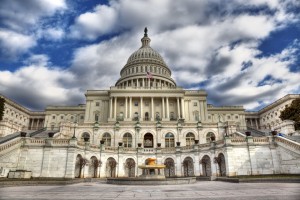 According to a poll conducted by NPR and Ipsos, a majority of the American public supports giving legal status to Deferred Actions for Childhood Arrivals (DACA) recipients.
According to a poll conducted by NPR and Ipsos, a majority of the American public supports giving legal status to Deferred Actions for Childhood Arrivals (DACA) recipients.
However, Congress has demonstrated their obvious partisan divide on the topic.
On Thursday, the Senate denied measures that could have established a solution for the thousands of Dreamers lacking immigration status.
Senators voted 54 to 45 against a bipartisan measure crafted by Sens. Mike Rounds (R-SD) and Angus King (I-Maine), meaning it was six votes short of achieving the 60 votes needed to advance legislation.
This measure would have given nearly 2 million young undocumented immigrants an eventual pathway for citizenship.
However, the bill would have also prevented green card holders from sponsoring their children to immigrate to the US, allocated $25 billion for building a wall along the border of Mexico, and allowed ICE not to differentiate between criminal and law-abiding undocumented immigrants, giving them the authority to indiscriminately deport all unauthorized immigrants.
The bill was rejected by most Republicans and supported by all Democrats, with the exception of three — Kamala Harris (D-CA), Tom Udall (D-NM), and Martin Heinrich (D-NM), who are representatives of border communities.
Another compromise bill considered less hawkish that Rounds King was sponsored by Sens. Chris Coons (D-DE) and John McCain (R-AZ). It failed 52-47, falling eight votes short of passage.
It too was controversial.
“The McCain-Coons bill, while promising a permanent path to citizenship for certain undocumented youth, proposes harmful provisions related to border security that would militarize the border and compromise with the values of a clean DREAM Act,” Cynthia Choi, Co-director of Chinese for Affirmative Action in San Francisco, said to AsAmNews. “Although spun as a “reasonable deal”, the bill is the latest concession to extremists who are using undocumented youth as a bargaining chip for increased surveillance and enforcement of border communities through smart wall measures.”
Two other bills in the Senate also failed.
At present, 690,000 undocumented immigrants who arrived in the U.S. with their parents as children have been protected from deportation by the Obama-era program, Deferred Action for Childhood Arrivals (DACA). Since Trump rescinded DACA, Dreamers can no longer apply for renewable work permits. As a result, more than 100 young immigrants lose their protected status each day, reports The NY Times.
DACA recipients could lose their status March 5 if a solution is not achieved. That’s the unilateral deadline imposed by Trump on Congress to pass legislation protecting DACA recipients.
“People do not think of border security as an Asian American issue,” wrote John C. Yang, president and executive director of Asian Americans Advancing Justice-AAJC in The Hill.
However, the uncertain future of immigration policy affects the Asian American community as much as any other ethnic community.
Asian immigrants make up 11 percent of the 11 million undocumented immigrants present in the United States.
“It is unconscionable that Congress is allowing the deadline for protections of immigrant youth – including 130,000 Asian Americans – to inch closer and closer when they should have been working on a bipartisan bill since the September announcement to end the DACA program,” AAJC expressed in a statement.
The Senate also denied the competing White House-backed plan with a vote of 39-60. This deal would have placed strict limits on legal immigration, ended the diversity visa lottery, and cut family-based legal migration.
In addition to uncertainty for Dreamers, documented immigrants and prospective immigrants worry about what the future may hold. Anxiety hinges on Trump’s desire to end family-based immigration.
The family reunification system, which Trump has derisively dubbed “chain-migration,” is an important component of the Asian American immigration narrative.
“The country should not revert to a time when immigration laws favored only Western European immigrants at the exclusion of all others,” Yang, president of AAJC, explained.
According to Yang, 92 percent of adult-aged Asian Americans are immigrants or children of immigrants. Two-thirds of these Asian Americans came to the U.S. through the family reunification system. Therefore, ending the family reunification system can be viewed as a “direct aim” at Asian Americans.
During Trump’s State of the Union, he asserted that “a single immigrant can bring in virtually unlimited numbers of distant relatives.” However, this anti-immigration rhetoric is a gross exaggeration of the realities of family-based immigration.
For certain countries, such as China, India, and the Philippines, the waiting line for a green card is so long that the process of achieving one for oneself or for a petitioned family member can take many years.
For example, in 1991, the government approved Ricardo Magpantay and his wife and young children to immigrate to America from the Philippines. However, by the time the visa was available, it was 2005, and Magpantay’s children were already adults and could not immigrate with him. Magpantay’s children are still in the Philippines waiting, reports The Inquirer.
Family reunification allows families to unite with loved ones, start family-owned businesses, and add diversity to our communities. Advocates of family reunification also explain that moving with one’s family signals immigrants’ commitment to make America a permanent home.
Immigrant advocates hope the White House and Congress are able to negotiate a fair bill for immigrant communities and families, both documented and undocumented. Until then, the futures of undocumented youths, immigrant families, and prospective immigrants remain uncertain.
AsAmNews has Asian America in its heart. We’re an all-volunteer effort of dedicated staff and interns. Check out our Facebook page and our Twitter feed, Please consider interning, joining our staff or submitting a story for consideration.
Image:
https://commons.wikimedia.org/wiki/File:White_House_lawn.jpg



